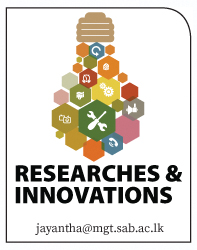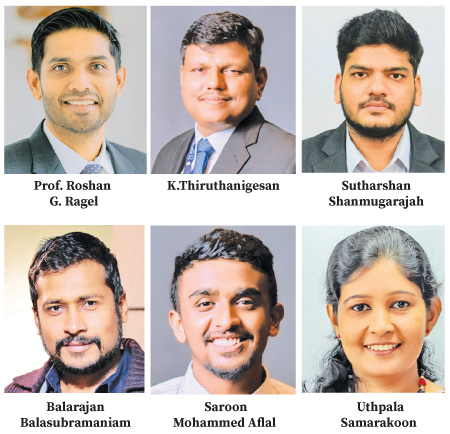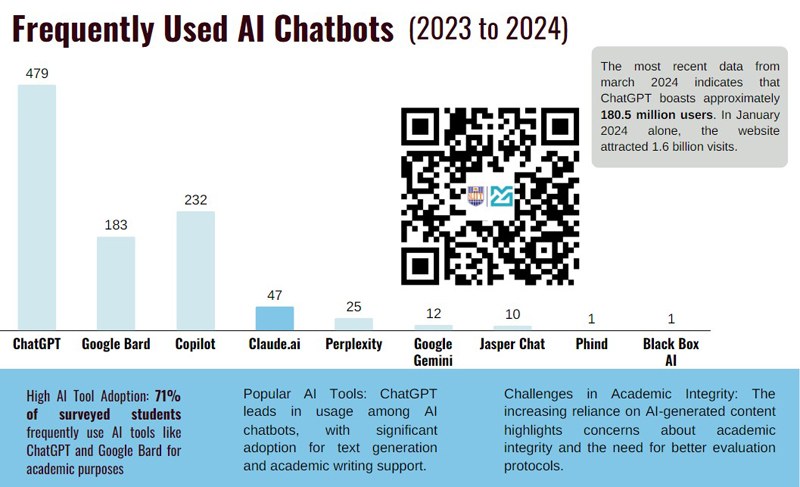In recent years, the adoption of artificial intelligence (AI) tools in education has seen a significant uptick globally. Sri Lanka is no exception to this trend, with higher education institutions increasingly integrating AI into their academic activities.
 As members of SLIIT Northern Uni Jaffna, Sri Lanka Institute of Information Technology (SLIIT), Malabe, and the University of Peradeniya, in this collaborative research initiative, our objective is to explore and document the various ways AI is being utilized in Sri Lankan higher education. This includes investigating the implementation of AI-driven tools for academic purposes, learning analytics, personalized learning experiences, and research advancements. This study has shed light on the extensive use of AI tools among students and educators in Sri Lankan universities.
As members of SLIIT Northern Uni Jaffna, Sri Lanka Institute of Information Technology (SLIIT), Malabe, and the University of Peradeniya, in this collaborative research initiative, our objective is to explore and document the various ways AI is being utilized in Sri Lankan higher education. This includes investigating the implementation of AI-driven tools for academic purposes, learning analytics, personalized learning experiences, and research advancements. This study has shed light on the extensive use of AI tools among students and educators in Sri Lankan universities.
Key findings
The study surveyed students across various universities and revealed that the adoption level of AI tools is notably high, especially tools like ChatGPT, Google Bard, Grammarly, GitHub Copi, and Duolingo. This trend indicates a shift towards utilizing advanced AI technologies to enhance learning and teaching experiences.
AI Chatbots for Text Generation: ChatGPT emerged as a widely used tool among students for generating text, demonstrating its utility in academic writing and research.
AI Grammar Tools: Tools like Grammarly and ProWritingAid are frequently employed for grammar checking, ensuring the accuracy and professionalism of students’ written work.
AI Tools for CV Generation: AI-powered platforms such as Kickresume and Resume.io are helping students craft impressive CVs, aiding their career pursuits.
AI Code Writing Tools: GitHub Copilot and Replit are popular among students for writing and debugging code, reflecting the integration of AI in computer science and engineering curricula.
AI Tools for Chart Development: Lucidchart and draw.io are commonly used for creating charts, highlighting the role of AI in visualizing data and concepts.
AI Tools for Assignment Writing: Tools like HyperWriteAi and Jenni.ai assist students in crafting assignments, showcasing AI’s support in academic writing.
AI Tools for Chat with PDFs: ChatPDF and PDF.ai facilitate interactions with PDF documents, enhancing students’ ability to engage with study materials.
AI Tools for PowerPoint Creation: Canva and Beautiful.AI are among the top choices for creating PowerPoint slides, indicating AI’s role in enhancing presentations.

AI Tools for Image Editing: Adobe Firefly and Midjourney are frequently used for editing images, reflecting AI’s application in creative and visual tasks.
AI Tools for Basic Research: Elicit and Scite are popular for conducting basic research, demonstrating AI’s assistance in academic research activities.
AI Data Analysis Tools: Tableau and Microsoft Power BI are widely used for data analysis, showcasing the importance of AI in handling and interpreting large data sets.
AI Tools for Learning and Tutoring: Quizlet and Duolingo are among the preferred learning and tutoring tools, indicating AI’s role in personalized learning experiences.
AI Tools for Scheduling and Planning: Tools like Clockwise and Reclaim help students manage their time effectively, reflecting AI’s role in productivity enhancement.
State of AI tools adoption
Adopting AI tools in Sri Lankan higher education is driving significant positive changes. AI-powered platforms enhance personalized learning, making education more accessible and engaging for students.
Tools like ChatGPT are being widely used to generate content, assist with grammar checks, and support research, thereby improving the quality of education. Educators benefit from AI by automating administrative tasks, creating interactive lesson plans, and providing personalized feedback, which allows them to focus more on teaching and mentoring students. The integration of AI prepares students for the future job market by equipping them with essential technological skills and fostering a culture of innovation.
The rapid adoption of AI in education also presents challenges. Ensuring equitable access to AI tools is a significant concern, as students from disadvantaged backgrounds may struggle to benefit from these technologies, potentially widening the digital divide. Data privacy and security are critical issues, requiring institutions to implement robust measures to protect student information.
The successful integration of AI tools demands comprehensive training and support for educators, who must be proficient in using these technologies and understanding their implications. Addressing these challenges is crucial to maximizing the benefits of AI in education while mitigating potential drawbacks.
While AI tools have revolutionized education, making learning more accessible and personalized, they also present significant challenges, particularly academic integrity. A growing concern is that students increasingly copy AI-generated assignments without understanding the content, leading to a superficial learning experience. This issue underscores the need for policymakers to reassess the protocols for online assignment submissions.
Many non-technical subject lecturers globally need to be more knowledgeable about grading AI-generated assignments, compromising the evaluation process’s integrity. To address this, institutions must implement more robust methods for detecting AI-generated content and ensure that educators are adequately trained to recognize and manage such instances.
Benefits of AI integration in education
Integrating AI into Sri Lankan higher education can truly transform the learning experience by making it more personalized and engaging. AI tools can tailor lessons to fit each student’s unique learning styles, helping them grasp concepts more effectively. They also improve access to quality education, especially in remote areas, by offering interactive content and virtual learning opportunities.
For educators, AI reduces administrative burdens and provides valuable insights into student performance, allowing them to focus on teaching and support. AI can enhance student engagement, improve academic outcomes, and support lifelong learning, making education more equitable and effective across Sri Lanka.
Implications for policymakers
The high adoption rate of AI tools in Sri Lankan higher education indicates the country’s readiness to embrace technological advancements. For policymakers, these findings provide valuable understandings that can further guide the development of strategies to integrate AI into the educational framework. This study emphasizes the need for continuous support and training for both students and educators to maximize the benefits of AI tools.
By understanding which tools are most utilized and valued by Sri Lankan undergraduates, policymakers can make informed decisions about resource allocation, curriculum development, and training programs. This will not only enhance the quality of education but also prepare students for a future where AI plays a pivotal role in various industries.
This information could encourage policymakers to form partnerships with tech companies and educational technology providers, ensuring that students in Sri Lanka’s tertiary education have access to the latest AI innovations. Such collaborations can create cutting-edge tools and resources that align with both technological advancements and educational requirements.
Adoption level of AI tools
A survey of 525 responses revealed that ChatGPT is the most popular AI chatbot for text generation, followed by Google Bard. Chatbots like claude.ai and Jasper Chat saw moderate use, while tools like Copilot, Perplexity, Gemini, Darl-E, and Phind were less common. Some respondents indicated they do not use AI tools, showing varied preferences in chatbot adoption. Figure 1 shows the frequently Used AI Chatbots from 2023 to 2024.
Figure 1: Frequently Used AI Chatbots (2023 to 2024)
A survey of 525 respondents across eight universities revealed a strong interest in learning about AI tools, with 49 percent highly enthusiastic and 30 percent expressing interest. Only 15% were neutral, 5% were slightly interested, and 1% were not.
Despite the availability of many AI tools, students mainly use ChatGPT and Google Bard, suggesting limited exploration of advanced tools. Encouraging broader AI adoption can boost creativity, problem-solving, and innovation. Students can better prepare for future technological advancements by integrating more AI tools into learning. Scan the QR code to share your insights on AI adoption in Sri Lankan education.
By:
Prof. Roshan G. Ragel.
University of Peradeniya
Ms. Uthpala Samarakoon
Sri Lanka Institute of Information Technology
Mr. Balarajan Balasubramaniam
Sri Lanka Institute of Information Technology (SLIIT) Northern Uni, Jaffna.
Mr. Kanagasabai Thiruthanigesan
Sri Lanka Institute of Information Technology (SLIIT) Northern Uni, Jaffna.
Mr. Sutharshan Shamugarajah
Sri Lanka Institute of Information Technology (SLIIT) Northern Uni, Jaffna.
Mr. Saroon Mohammed Aflal
Sri Lanka Institute of Information Technology (SLIIT) Northern Uni, Jaffna.









